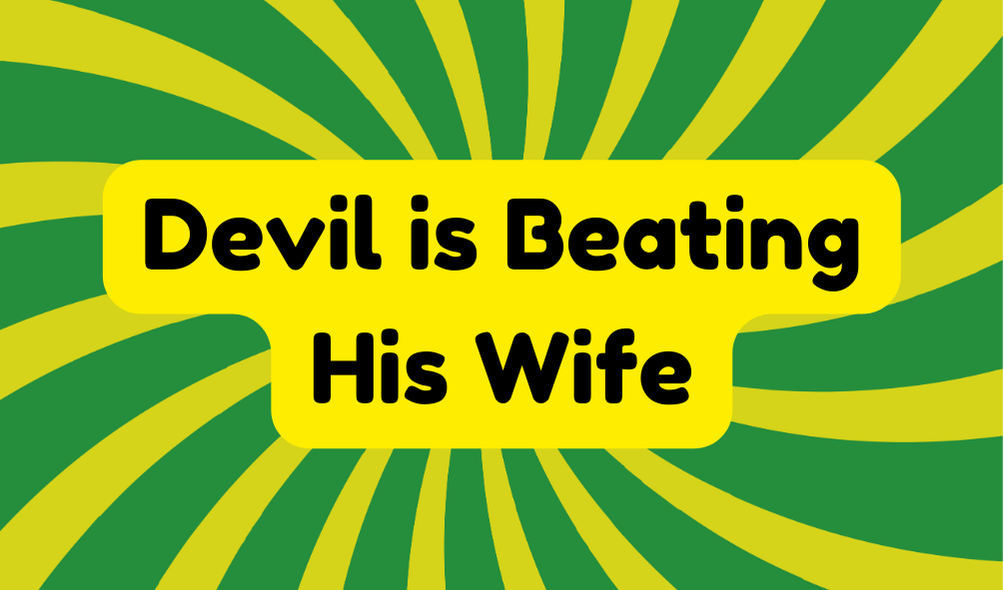The phrase "the devil is beating his wife" describes a rare weather phenomenon: rain while the sun shines. This saying has roots in various cultures and blends folklore with conversation. While it adds color to discussions about unexpected weather, it raises concerns due to its implications about domestic violence. It's essential to reflect on the historical context and the appropriateness of such expressions today. If you're curious about its origins and alternatives, you'll find more intriguing details ahead.
Synonyms
When it comes to the phrase "the devil is beating his wife," it might sound unusual, but it captures a unique weather phenomenon where it rains while the sun shines. It's worth mentioning that there are several sunshower synonyms and folklore expressions that convey similar meanings. Here are a few:
- Monkey's wedding
- Devil's shower
- Witch's wedding
- Rain on a sunny day
While these expressions may vary regionally, they all highlight the quirkiness of experiencing rain and sunshine together. It's a reminder of how language and weather intertwine in our lives, adding character to nature's surprises.
Example of Sentences
It's interesting to see how phrases like "the devil is beating his wife" pop up in everyday conversations about the weather. This peculiar expression adds a unique flavor to our chats. Here are some examples given to illustrate sentence structures using this phrase:
- "Look at that sunshower; I guess the devil is beating his wife again."
- "Every time it rains while the sun shines, I hear someone say the devil's at it."
- "When I see rain and sun together, I can't help but remember that saying."
- "My grandma always joked that it meant good luck when the devil was busy."
Such phrases mix folklore with daily life.
Origin
Although many people casually use the phrase "the devil is beating his wife" to describe a sunshower, its origins reveal a fascinating blend of folklore and cultural history. This expression, tied to various weather phenomena, has roots in multiple cultures, reflecting a folkloric significance that goes beyond mere weather observation. From tales of the devil wielding a walking stick in the Southern United States to references in a 1703 French play, the phrase illustrates how language evolves within communities. Yet, it raises questions about the appropriateness of invoking domestic violence in our idioms. This complexity deserves our careful consideration and critical reflection.
Collocations
The phrase "the devil is beating his wife" captures a unique interplay of words that reflects both its weather-related meaning and its cultural implications. This expression reveals a fascinating blend of cultural expressions and weather phenomena that deserves scrutiny. Consider these collocations:
- Raining while sunny – A vivid imagery illustrating this rare event.
- Cultural folklore – Binds communities with shared meanings.
- Weather sayings – Connects generations through oral traditions.
- Humorous interpretation – Reflects on the light-heartedness amidst seriousness.
While interesting, we must question its appropriateness, as cultural contexts evolve. Language influences perceptions, and some phrases may need revisiting.
How to Use in Everyday Language
Many people might find themselves puzzled when they first hear the phrase "the devil is beating his wife." To understand how to incorporate this expression into everyday conversation, it's essential to grasp its meaning and context. You can use it when discussing unexpected combinations, like a sunshower—rain while the sun shines. This phrase serves as a cultural expression linking folklore and humor, so I'd suggest trying it out with friends who appreciate innovative language. However, be cautious; some find it harsh and inappropriate. Engaging in such dialogues can enrich your understanding of cultural nuances while fostering thoughtful conversations.
Why Is It Still Relevant Today?
Why does a phrase about weather phenomena, like "the devil is beating his wife," still capture our attention today? Its cultural significance spans generations, yet we witness generational shifts that challenge its use. As understanding grows, some may find the phrase outdated or even problematic.
| Positive Aspects | Critical Perspectives |
|---|---|
| Connects us to folklore | Possible normalization of violence |
| Sparks curiosity | Lack of awareness in youth |
| Reflects regional identity | Dismissed as outdated |
Ultimately, engaging with this expression invites us to reflect on our values and beliefs around language today.







